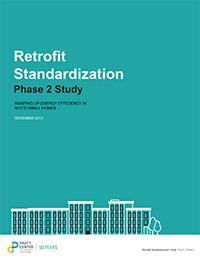
Pratt Center Research
Retrofit Standardization Phase 2 Study
Report | December 16, 2015
Pratt Center for Community Development launched the Retrofit Standardization Study to test a simplified, scalable approach to implementing energy efficiency upgrades in New York City’s 1-4 family buildings. The first phase of the study, energy audits were conducted on 22, two-family, attached, gas-heated, masonry homes, revealing a common package of energy efficiency measures that were cost-effective, saving homeowners on average an estimated 13% in energy use while variations of this package with additional measures were estimated to increase the potential savings to 21%.
Completed in September 2015, the second phase of the study continued the testing begun in the first phase by examining the process, especially the interactions with homeowners, required to scale a standardized approach to energy retrofits. We offered a pre-determined set package of energy retrofit measures which included air sealing and weather stripping the residence and basement, insulating the roof hatch, insulating basement pipes, replacing incandescent light bulbs with LEDs, installing low-flow water fixtures, adjusting the hot water temperature, installing carbon monoxide and smoke detectors, and ensuring adequate fresh air access for the boiler’s combustion process. The report details minor logistical and technical challenges, as well as insights regarding homeowner engagement that will help inform outreach and engagement strategies in the next phase of the project.
